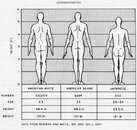… We've convinced Black Americans that they should be afraid of water, so they are…
I have come to believe that it is more complex than that. I grew up around a lot of black Americans and noticed that swimming was not as popular with them. I never really gave it much thought until joining the Navy. Passing the swimming test in boot camp was mandatory. No pass and you were a civilian again… probably seated in the draft board waiting room. Most of the black guys (about 4) and one white guy in my company were having trouble passing so two of us volunteered to help them… mostly because it meant extra time in the pool.
They had us start them with treading water, gave us a bamboo pole, and basically had them jump in the deep end of the pool. Three of the black guys sank to the bottom like rocks. We swung the pole to them and helped pull them up. I was dumbfounded by how heavy they were in the water. I worked with the three sinkers while the other recruit helped the two floaters refine their technique.
All three of the guys I was working with were tall and husky. I demonstrated buoyancy to them, emphasized keeping lungs expanded like water wings, and keeping as much of their body in the water as possible. OK, they gulp a max lung-full and lean back. Suddenly they are looking up at me lying flat on the bottom… but they didn’t sink quite as fast. Everyone I had ever seen to that point would at least float high enough out of the water to breathe with just their mouth and nose out of the water.
Anyway, we got them to the point where they could tread water for the time required and swim the required distance, but they had to work much harder at it than everyone else who could float.
The experience stuck with me and years later I came across the attached chart in a book on human engineering. It suddenly all fell into place. Notice that, on average/the 50 percentile, the proportions of the black males in the study have longer limbs and relatively short torsos compared to the other two race samples. The chart is true to the accompanying anthropometric data.
Human buoyancy is largely a balance between total bone weight and lung/air space displacement. All the other tissues in the body are +/- a few percent of the weight of sea water. Long heavy bones + proportionally small lung capacity = negative buoyancy. I have never been able to find data that includes lung volume with enough of the other anthropometric data to be more precise.
Obviously there is a huge variation within each race/anthropological group. If this chart sample holds true across the population, then it would indicate that a greater percentage of blacks would be at a disadvantage when swimming than the other races. A negatively buoyant individual must expend more energy to stay on the surface to breathe and can’t rest in the water. Therefore, that energy is not available for propulsion. This in turn would have a significant impact on cultural evolution. Shrimps like me are less likely to get a basketball scholarship just like negatively buoyant individuals are less likely to make the swim team. Fewer people in your family and community with swimming skills will reduce a person’s likelihood that they will learn to swim, even when an individual has good buoyancy characteristics.
This obviously doesn't explain all cultural discrepancies but it does strike me that it is a likely root cause of the phenomenon.




